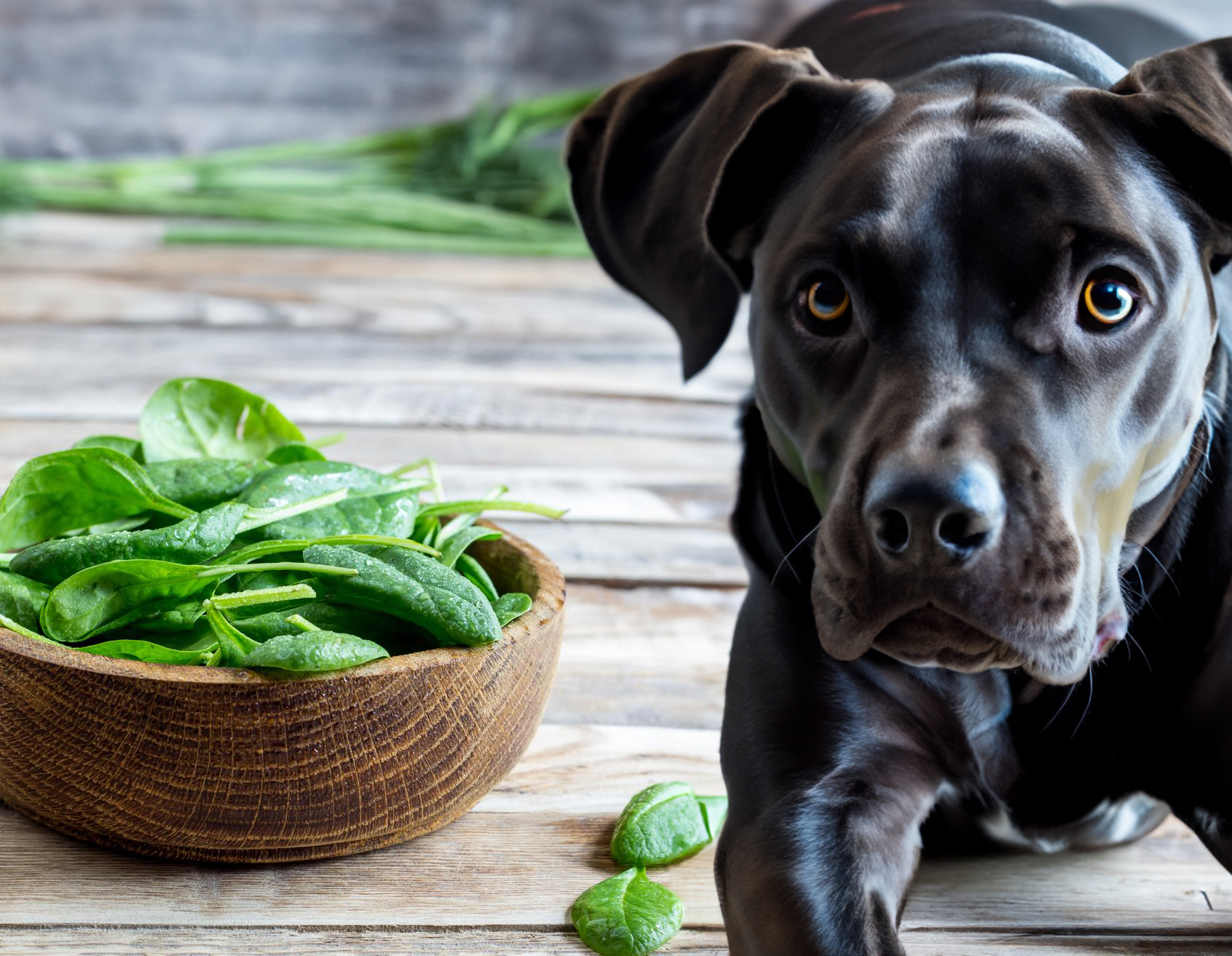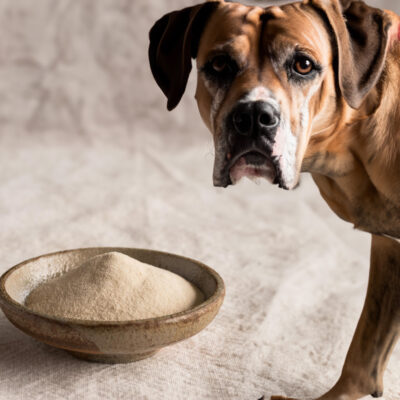Can Dogs Eat spinach? It’s an important question to ask when deciding what to feed your four-legged friend. Spinach is a popular leafy green that is packed with vitamins and minerals, but is it safe for dogs? In this blog post, we will explore the good, the bad, and the leafy when it comes to feeding spinach to your pup. We’ll look at the nutritional benefits, any potential risks, and provide tips on how to safely introduce this food into your dog’s diet.
What is Spinach?
Spinach is a leafy green vegetable that belongs to the Amaranthaceae family. It is native to central and southwestern Asia but is now cultivated worldwide. Spinach has been consumed by humans for centuries due to its nutritional benefits and versatile culinary uses. This leafy green vegetable is rich in essential vitamins and minerals, making it a popular choice for those looking to boost their overall health.
Spinach leaves are dark green in color and have a slightly bitter taste. They are known for their distinctive texture and can be eaten raw in salads or cooked in a variety of dishes. Spinach is low in calories and fat, making it an excellent choice for those watching their weight or looking to maintain a healthy diet.
In terms of nutritional content, spinach is a powerhouse of nutrients. It is packed with vitamins A, C, and K, as well as folate, iron, and calcium. These nutrients are essential for maintaining healthy bones, promoting good eyesight, supporting the immune system, and aiding in digestion. Spinach also contains antioxidants, such as lutein and zeaxanthin, which are known for their ability to protect the body against oxidative stress.
While spinach is a nutritious food for humans, the question remains: is it safe for dogs to eat? In the following sections, we will explore the nutritional value of spinach for dogs, potential risks associated with feeding spinach to your furry friend, and how to safely incorporate spinach into your dog’s diet.
The Nutritional Value of Spinach for Dogs
Spinach is not only a nutritious food for humans but also for our furry friends. When it comes to the nutritional value of spinach for dogs, it’s important to understand the benefits this leafy green can provide.
One of the key nutritional benefits of spinach is its high vitamin content. Spinach is rich in vitamins A, C, and K, all of which are essential for a dog’s overall health. Vitamin A supports good eyesight and a healthy immune system, while vitamin C helps with collagen production and acts as an antioxidant. Vitamin K plays a crucial role in blood clotting and bone health.
Spinach is also packed with minerals that are important for dogs. It contains iron, which is necessary for oxygen transport and energy production. Calcium is another mineral found in spinach, which is essential for strong bones and teeth. Additionally, spinach contains folate, a B vitamin that helps with cell division and growth.
Furthermore, spinach is a good source of fiber, which can help with digestion and maintaining a healthy weight. The fiber in spinach can also aid in regulating blood sugar levels.
Overall, spinach provides a range of vitamins, minerals, and fiber that can contribute to a dog’s well-being. However, it’s important to remember that moderation is key. Too much spinach can cause digestive upset, so it’s best to consult with your veterinarian before introducing spinach into your dog’s diet.
Potential Risks of Feeding Spinach to Your Dog
While spinach can be a healthy addition to a dog’s diet, there are a few potential risks that pet owners should be aware of. One of the main concerns is the high oxalate content in spinach. Oxalates are naturally occurring substances found in many plants, including spinach. In high amounts, oxalates can bind to calcium and form crystals, which can potentially lead to kidney and urinary issues in dogs.
Another potential risk is the presence of pesticides or other chemicals on spinach leaves. Dogs can be more sensitive to these substances, and consuming spinach that has been treated with pesticides can be harmful to their health. It is important to thoroughly wash spinach before feeding it to your dog, or better yet, choose organic spinach to avoid exposure to pesticides.
Additionally, some dogs may have difficulty digesting spinach, especially if they have a sensitive stomach or a history of digestive issues. Feeding large amounts of spinach can lead to gastrointestinal upset, including diarrhea or vomiting. It is best to introduce spinach gradually into your dog’s diet and monitor their reaction to ensure they can tolerate it.
It is always recommended to consult with your veterinarian before introducing any new food into your dog’s diet, including spinach. They can provide personalized advice based on your dog’s specific health needs and help determine if spinach is a safe and appropriate addition to their diet.
How to Feed Spinach to Your Dog Safely
Feeding spinach to your dog can be a healthy addition to their diet, but it’s important to do it safely. Here are some tips on how to feed spinach to your dog without any risks:
Start with small amounts: When introducing spinach to your dog’s diet, start with small portions to see how they react. This will help you determine if they tolerate spinach well or if it causes any digestive upset.
Cooked or raw: You can feed spinach to your dog either cooked or raw, depending on their preferences. Some dogs may prefer cooked spinach as it is easier to digest, while others may enjoy the crunch of raw spinach leaves. Make sure to wash the leaves thoroughly if you choose to feed them raw.
Cut into bite-sized pieces: Before feeding spinach to your dog, ensure that the leaves are cut into small, manageable pieces. This will make it easier for them to eat and prevent any choking hazards.
Mix with other foods: To make the spinach more appealing to your dog, you can mix it with their regular food or incorporate it into homemade treats. This can help mask the taste of spinach and make it more enticing for your furry friend.- Consult with your veterinarian: Before making any changes to your dog’s diet, it’s always a good idea to consult with your veterinarian. They can provide personalized advice and help determine if spinach is suitable for your dog’s specific dietary needs.
By following these guidelines, you can safely incorporate spinach into your dog’s diet and provide them with the nutritional benefits this leafy green has to offer. Remember, moderation is key, and always monitor your dog’s reaction to ensure they are tolerating spinach well.
Other Leafy Greens that are Safe for Dogs to Eat
While spinach is a nutritious option for dogs, there are also other leafy greens that can be safe and healthy for them to consume. Here are a few leafy greens that you can consider incorporating into your dog’s diet:
- Kale: Similar to spinach, kale is packed with vitamins and minerals. It is an excellent source of vitamin K, which supports blood clotting and bone health. Kale also contains antioxidants and fiber, making it a great addition to your dog’s diet.
Romaine lettuce: Romaine lettuce is another leafy green that is safe for dogs to eat. It is low in calories and high in fiber, which can help with digestion. Romaine lettuce also contains vitamin A and C, which are essential for a dog’s overall health.
Arugula: Arugula is a leafy green that has a slightly peppery taste. It is rich in vitamins A and K, as well as calcium and iron. Arugula can provide a nutritional boost to your dog’s diet and add some variety to their meals.
Spinach alternatives: If you’re looking for other options besides spinach, you can also consider incorporating other greens such as collard greens, Swiss chard, or bok choy into your dog’s diet. These leafy greens offer similar nutritional benefits and can be a healthy alternative to spinach.
When introducing any new food into your dog’s diet, it’s important to do so gradually and in moderation. Always consult with your veterinarian to ensure that the leafy greens you choose are safe for your dog and suitable for their specific dietary needs.
Can Fido Chow Down on Bacon? Let’s Find Out!










